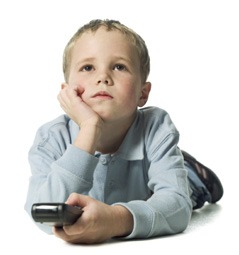Pic courtesy: Getty Images/Earth Talk Magazine
US Kids glued to Television : Exposed to background TV for more hours!
A number of studies have found evidence that too much television is bad for children’s development, even when it’s playing in the background and kids are not watching. Now a study has tracked just how much background TV kids get and it’s a lot — 232.2 minutes or nearly 4 hours worth every day.
The average amount is even greater among some, especially children who are younger, African-American or from the poorest families, finds the study in today’s Pediatrics. The American Academy of Pediatrics recommends that children under age 2 not be exposed to any television.
The study was presented in May at a meeting of the International Communication Association. It was conducted using a nationally representative telephone survey of 1,454 parents with at least one child between the ages of 8 months and 8 years old.
Among questions that parents were asked: how often their TV was on when no one was watching; whether their child had a TV in their bedroom and the number of TVs in the home.
It found that in addition to actual TV viewing, children under age 2 and African-American children were exposed to an average of 5.5 hours a day of a TV playing in the background; children from the poorest families were exposed to nearly 6 hours per day.
The nearly four hours of background TV exposure “easily dwarfs” the 80 minutes of active TV viewing the average child in this age group absorbs daily, says the study.
“You’re looking at three times the amount, which is enormous,” says Matthew Lapierre, one of the study authors, an assistant professor of communication studies at the University of North Carolina-Wilmington. “It’s really kind of shocking,” he says.
The finding among African-Americans “wasn’t unexpected,” says Lapierre noting that statistically, their households “are often found to be more TV-centric,” compared with other groups, with more TVs per household and more of those TVs in bedrooms.
He suspects that the high rate of background TV among very young children may have to do with parents and caregivers leaving the television on, even when they’re not actively watching, to “break up the monotony” of being with an infant or toddler for long stretches of the day.
The study notes that background television exposure has been “linked to lower sustained attention during playtime, lower quality parent-child interactions, and reduced performance on cognitive tasks.”
Heather Kirkorian, an assistant professor of human development and family studies a researcher at the University of Wisconsin-Madison who has published studies on background television’s impact on both parent-child interaction and children’s play patterns, says “until now we could only guess at the extent of the impact in children’s day-to-day lives.” The new study “documents just how great the real-world impact may be, particularly for very young children.”
The American Academy of Pediatrics recommends that children under age 2 not be exposed to any television.
To reduce background TV exposure, the study recommends turning off the TV when no one is watching and at key points during a child’s day, such as bedtime and mealtime.
Sources: USA Today








